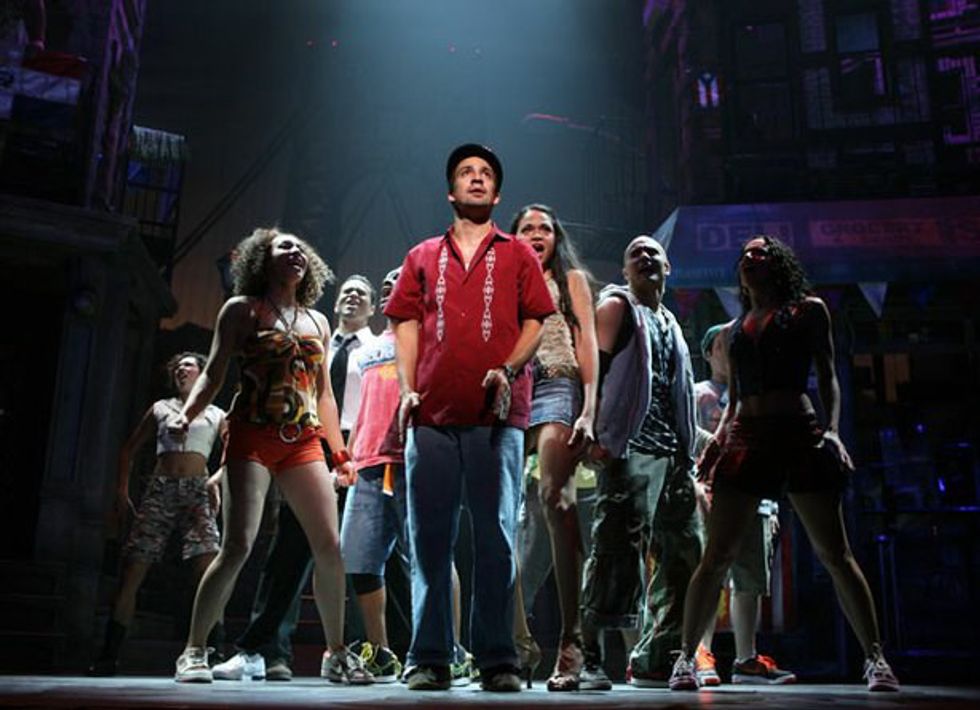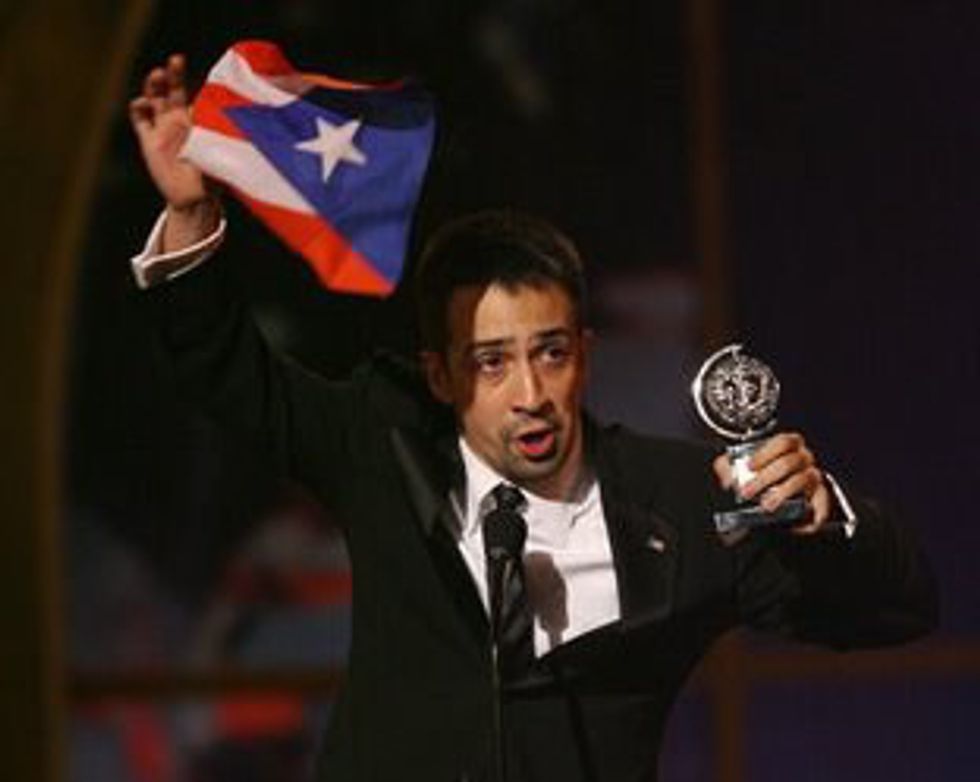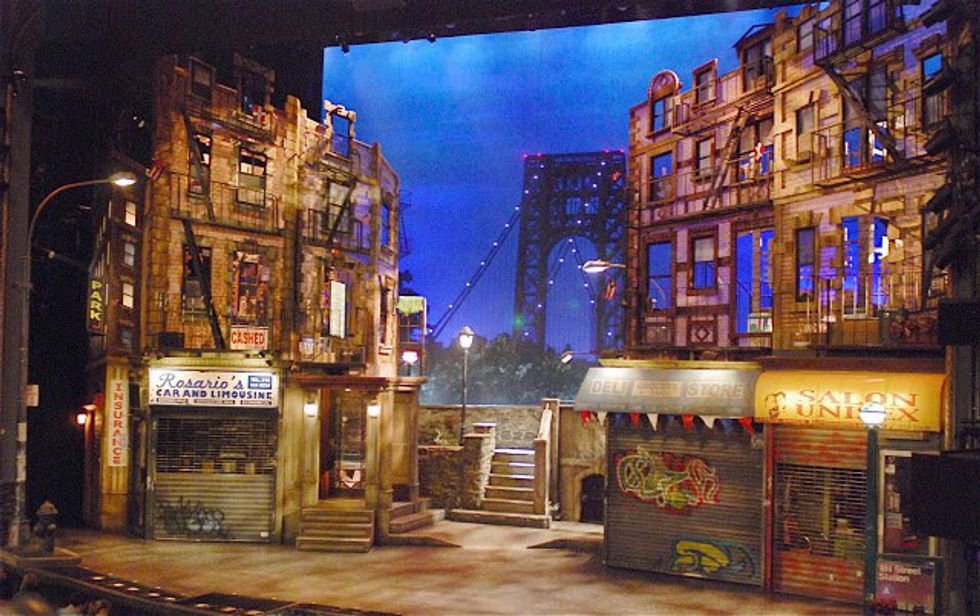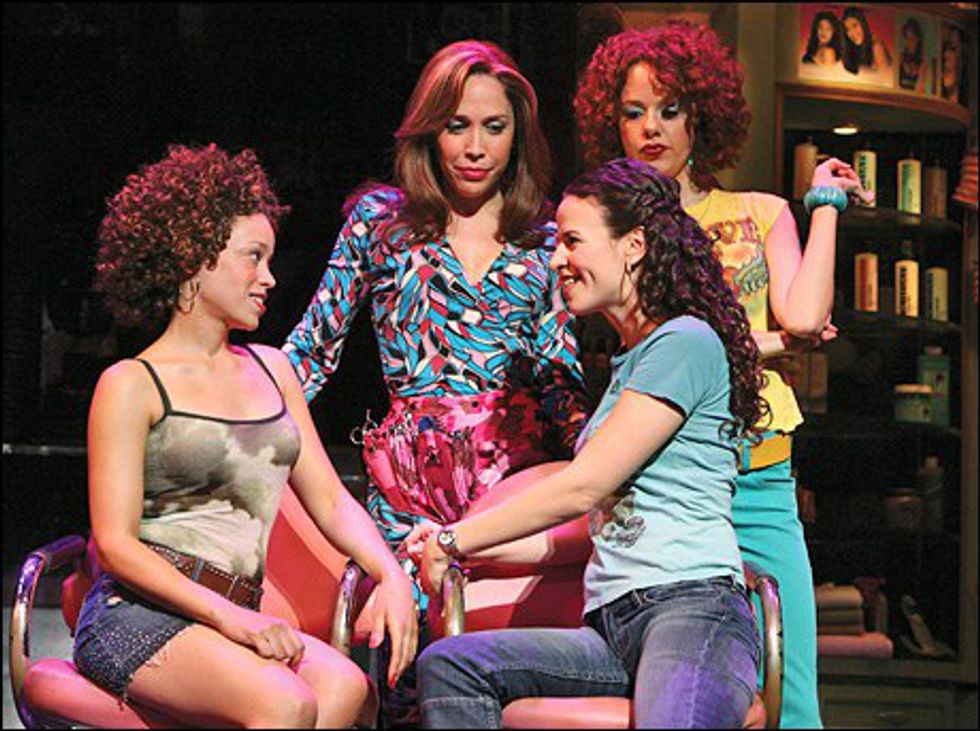Last week, I was invited by a fellow white person to audition for a production of “In The Heights.”
For those of you unfamiliar, “In The Heights” was the Lin-Manuel Miranda groundbreaker of the 2008 Broadway season, a love letter to Washington Heights and a slice of the Latinx* experience brought to the stage in vibrant rhythms, bolero beats and the now-famous nimble rhymes of the star himself.
In an article for The Independent by Tom Teodorczuk, Miranda discussed the catalyst for the show’s creation: a “determination to step outside the straight jacket that he feels Latino performers are placed into.” As Lin himself explains, “I knew I wanted to write musical theater but I knew I didn’t dance well enough to play Bernardo [from ‘West Side Story’] and if you’re a Puerto Rican actor, that’s about what you get, either Bernardo or Paul in ‘A Chorus Line.’ That’s what's available to them. So I began writing a show about the neighborhood next to my neighborhood growing up in New York. It was almost a dare to us.”
“In The Heights,” both in its creation and its storyline, is about carving out a space for yourself and people like you, and telling your story. As Usnavi (Miranda’s character; the protagonist) sings in the finale,
"Yeah, I’m a streetlight, chillin’ in the heat!
I illuminate the stories of the people in the street
Some have happy endings, some are bittersweet
But I know them all and that’s what makes my life complete!”
The people of Washington Heights open singing, “In the heights, I hang my flag up on display / It reminds me that I came from miles away.” Throughout the show, characters grapple with their ethnic or national identities, their experience of being the children of immigrants, what it means to be Latinx (among many other things). Perspectives range from Carla’s humorous verse in the lively Act 2 number Carnaval del Barrio :
“My mom is Dominican-Cuban, my dad is from Chile and PR which means:
I’m Chile-Domini-Curican… But I always say I’m from Queens!”
To Nina’s more serious musings in Act 1’s When You’re Home:
When I was younger I'd imagine what would happen
if my parents had stayed in Puerto Rico
Who would I be if I had never seen Manhattan
If I lived in Puerto Rico with my people?
My people...
I feel like all my life I've tried to find the answer
Working harder, learning Spanish[…]”
Usnavi proudly raps that he and his parents...
“Emigrated from the single greatest little place in the Caribbean:
Dominican Republic! I love it — Jesus, I’m jealous of it
And beyond that, ever since my folks passed on
I haven’t gone back — Goddamn, I gotta get on that!”
His desire to return to what he (for a majority of the show) feels is his homeland, his place of identity and center of self, drives a good portion of the show’s plot, and overall, one of the central themes of the piece is cultivation of identity and the power of community and identity. Faced with a blackout and rising rent prices, seeing the neighborhood changing and slipping away from its character, Usnavi rallies the neighborhood:
“Maybe we’re powerless, a corner full of foreigners […]
Y’all could cry with your head in the sand
I’m gonna fly this flag that I got in my hand!”
The music swells as he exuberantly shouts, “Can we raise our voice tonight? / Can we make a little noise tonight?!” The community responds,
“Esa bonita bondera!/ Contiente mi alma entera!”
[translation: “This beautiful flag! It contains my whole soul!”]
When Miranda accepted the 2008 Tony Award for Best Musical for "In The Heights," he waved a Puerto Rican flag.
Above all else, the soul of the show is the pulsing life in the neighborhood, “forgotten boleros” floating through the air and the “taste [of] beans and rice]” ever-present. National identities proudly cultivated, heritage and character colliding when, as Usnavi raps, “from Puerto Rico to Santa Domingo/ Wherever we go, we rep our people!”
The theater is a place of expression, of identity and storytelling, of the most intensely ancient urges to hear and be heard, to understand and to be understood. I believe it is in the theater, creating worlds and people, grasping at connection and meaning, presenting and discussing our world, that we become the most human. Perhaps it is because theater is my calling, the way I tap into the soul of the world, or perhaps this is a simple truth.
Boston-based actor Jeremiah Kissel held a discussion/lecture in one of my Freshman year classes, it was his description of theater that profoundly resonated with me. I (and my chicken-scratch notes) recall it as follows:
If you’re an actor, you’re a shaman; a priestess. You’re one of those humans who walks through the humans and someone who creates something in the center to give everybody a place to go together, as humans, to understand life a little bit better. You are a priestess of the human soul, and that is what your life and your art are about. It’s coming together and talking about something. It’s so the people who watch it wake up the next day and they love their children a little bit more. It is a holy, holy thing.
Lin-Manuel Miranda’s “In The Heights” is born from the desire to tell stories currently untold, to raise voices unheard and to transform the representation of the Latinx community and its many diverse peoples and experiences in theater. As he put it, “There’s other shit I want to write. It’s interesting, I think of it as, What’s the thing that’s not in the world that should be in the world? 'Heights' is very much like, there should be a show with Latino people where we aren’t gang members and drug dealers, because that’s been super well represented already.” His recent sweeping success with “Hamilton” further attests to the move toward further diversity and representation on Broadway; it is slow, but it is coming. As the neighborhood community say in “In The Heights,” “No pare! Sigue, sigue!” Don’t stop! Keep going. Keep pushing for theater, a place the voiceless come to find a voice, to be an instrument of positive action and change.
Which ... brings us back to my proposed audition for “In The Heights.”
If you don’t know me personally, here’s the deal: I’m white. I’m really white. I’m compare-my-tan-to-the-underside-of-your-forearm-and-my-tan-will-still-be-lighter white. I’m Western-Euro-mutt-royal-bastards-and-Salem-Witch-Trials white. I’m irrefutable-societal-privilege white. I’m like … 99-100 percent white. That’s the way the chromosomes crumble.
I'm about a quarter Polish, and Poland was once part of Russia which, incidentally, is from whence the actress who portrayed perhaps musical theater's most iconic Latina protagonist in the film adaptation of "West Side Story" hails. A casual depiction of brownface, a white woman playing a woman of color. Yikes.
Now rightfully, the idea that I, Whitey McWhiterson of EuropeanDescentsville, could audition for “In The Heights” was … disconcerting. The show, as previously described, is a deeply influential piece that presents the Latinx experience in a way not seen on Broadway before its premiere. What business do I, a white actress, have auditioning for one of the few roles in musical theater specifically designed for Latina performers? A lot of talented, capable, brilliant artists of the same race as the character are out there clamoring for a shot, and I'm just going to waltz in there and put myself forward as someone to take it from them?
When I expressed this discomfort at the suggestion, the response I received was a common one, something I’ve heard tossed around in my many years in theater. Essentially, the excuse goes like this: it wasn't up to me who they cast, so why not go for it? The parts were "great for my voice," and there was the audition notice. And of course, it’s a job, and stage actors can be likened to sharks: auditions are like a feeding frenzy for roles, and if we stop swimming from casting call to casting call, our careers are dead in the water. So why not go audition?!
It’s true, I don’t make the final casting decision. I’m not, to borrow a phrase from the man of the hour, in “the room where it happens,” so of course, I have no idea what they want or are looking for in a cast. True, my clear and mature mezzo sound, along with certain emotional life experiences, make “Breathe” a beautiful song to have in my repertoire. Still, the more I thought about this suggestion and justification, the more it made my insides squirm.
Here's the thing: it is up to me who they cast.
If I ever consciously put myself up for a role that is expressly for someone non-white, I am directly responsible for the whitewashing of that role.
Actors at all levels of entertainment, from community theater to blockbuster Hollywood films, are personally responsible for the parts they accept. There are multiple recent examples, from Rooney Mara as a native princess in "Pan" to Scarlett Johansson as an Asian commander in "Ghost In The Shell," of flagrant and inexcusable whitewashing in media. You can’t crook your finger without picking the proverbial nose of a biblical film set in Egypt or the Middle East that’s just chock-full of white people. These examples come from the film industry, admittedly fundamentally different game, but the rampant problem exists in theater as well.
So I want to make it extremely clear to every theater artist: you are responsible.
You are responsible for rejecting roles intended for people of color. You are responsible for speaking up when instances of whitewashing occur. You are responsible for refusing to participate in this cycle of prejudice and marginalization.
This particular instance was the first time I had been confronted with the issue of whitewashing in casting in my semi-professional theatrical life, and it served as a wake-up call. The attitude that I, as an actress, am not responsible for being cast in roles has to change.
In the same way that being a male feminist involves actively voicing objections to the patriarchal culture in which you are privileged, being a white actor means actively challenging and refusing to participate in the whitewashed casting of shows that exists at all levels of theater, show business and media. The act of auditioning for those roles is an act of participation in whitewashing. The acceptance of those roles is an act of participation in whitewashing.
Theater is a place of representation and articulation, a zone of convergence, a platform to parse the experience of being a person. It is a place of integrity and identity where we explore our humanity through varying lenses, reveling in the complexity of the human condition.
It is paramount to your integrity as an artist and as a person that you honor this space of expression, and do everything in your power to make it accessible to all artists and all voices. In order to accomplish this, you must take responsibility for your personal agency within in the cycle of prejudice that rampant whitewashing indicates is present in casting.
You are responsible for every role you seek or accept, and to think and act otherwise is naiveté bordering on sinister ignorance.
Things will not change unless we, white actors, actively resist and combat whitewashing in our own spheres of theatre artists, so keep up the fight. No pare- sigue, sigue!
*for more information on the author’s choice to use this word, please see this informational comic.

























